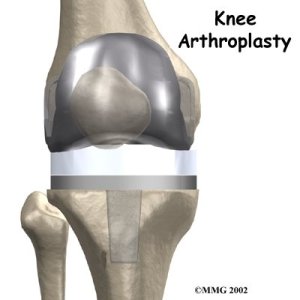Total Knee Replacement
When arthrits in the knee becomes severe and limits day-to-day activity, your doctor may recommend knee replacement surgery. Knee replacement surgery has been performed for more than 30 years. Recent advances in technology have made total knee replacement more durable.
Total knee replacement can decrease pain, correct deformity, improve motion and improve function in people with arthritis. Knee replacement patients can return to many activities that they had stopped because of pain.

What is a Total Knee Replacement?
Total knee replacement surgery involves the removal of the diseased parts of the bones in the knee. The surfaces are replaced with man-made materials. Typically, the surfaces of the bones are shaved down to remove the worn cartilage. Next, the bones are fitted with knee replacement implants which are cemented in place. Then, a bearing surface made out of special, medical-grade polymer is inserted to act as the joint surface. This procedure removes the worn-out bone edges and replaces them with smooth materials. It also can correct the alignment of the knee.
Knee replacement is done in a hospital or surgical center. The surgery takes anywhere from one to three hours to perform, depending on the complexity of the operation. General or spinal anesthesia is used for the surgery.
Many people can go home the same day of surgery. Others require 1-3 days in the hospital. Everyone receives antibiotics to protect against infection. Everyone receives medicine to protect against blood clots. Pain medication is given to assist wtih pain control.
In the hospital, physical therapy begins. Most patients use a walker or crutches for the first few weeks after surgery until they are strong enough to walk without gait aids. Normal activities can gradually resume, but extreme activities or high impact activites are not recommended.
Going to a facility after total knee replacement is not recommended except for in extreme cases. Most insurance plans do not cover inpatient physical therapy. It is extremely important to arrange your personal support network before joint replacement. Recovery can be difficult and patients will need help with everyday tasks (shopping, cooking) for a few weeks after surgery. Please arrange this with loved ones ahead of time.
When should I consider knee replacement?
When pain and decreased function from arthritis has limited day-to-day activity, it's time to think about knee replacement. Many patients will try physical therapy and medication without relief of symptoms. Other patients will notice increasing deformity of the knee (the knee becomes very "knock-kneed" or "bow-legged"). Other patients will experience loss of motion of the knee, where they can no longer straighten or bend the knee. Any of these are indications that knee replacement might be a good choice.
What about my general health and knee replacement surgery?
Total knee replacement is a major surgery. Your general doctor will need to perform a thorough physical examination, blood tests and other studies before surgery. Sometimes, other medical treatments are required before someone is able to undergo knee replacement surgery.
Medical problems like diabetes, heart disease, kidney disease, lung disease, obesity, or severe circulatory disease can increase risk of complications after surgery. Smoking or use of nicotine delivery devices also increases surgical risk. If you smoke, it is required that you stop smoking before surgery. There are smoking cessation programs and we can refer you to one of these for assistance. Dr. Lajam will discuss this with you before surgery.
Am I too fat for knee replacement?
Patients who are severely overweight have a higher chance of having problems during and after total knee replacement. Studies have shown that risk for infection and blood clots can be 3 to 7 times higher than in patients without obesity. First of all, the fatty tissues in the leg make the actual operation more difficult. Surgery may require more time, enhanced implants, and larger incisions.
After surgery, there is an increased chance for wound problems in patients with obesity. Dr. Lajam will ask for you to monitor your wound and to come in for more frequent evaluation if this is the case.
Also, the total knee replacement materials are engineered to withstand certain loads. At higher loads (as with very heavy patients) these materials can wear out, loosen or fail faster than they would in lighter patients.
Dr. Lajam and her team will discuss weight loss strategies for before surgery. Patients are urged to work with a nutritionist to reduce weight before surgery so that surgical risks can be minimized. Please note that patient with Body Mass Index of 45 or higher will need to show weight reduction before surgery can be scheduled.
What activities can I do after knee replacement?
Most patients can return to low impact activities after healing is complete. Cycling, walking, light hiking, doubles tennis, and golf can be enjoyed after recovery. However, extreme motions or extreme activities are not recommended. There may be restrictions on kneeling after knee replacement. Ask your surgeon if you have questions about specific activities.

